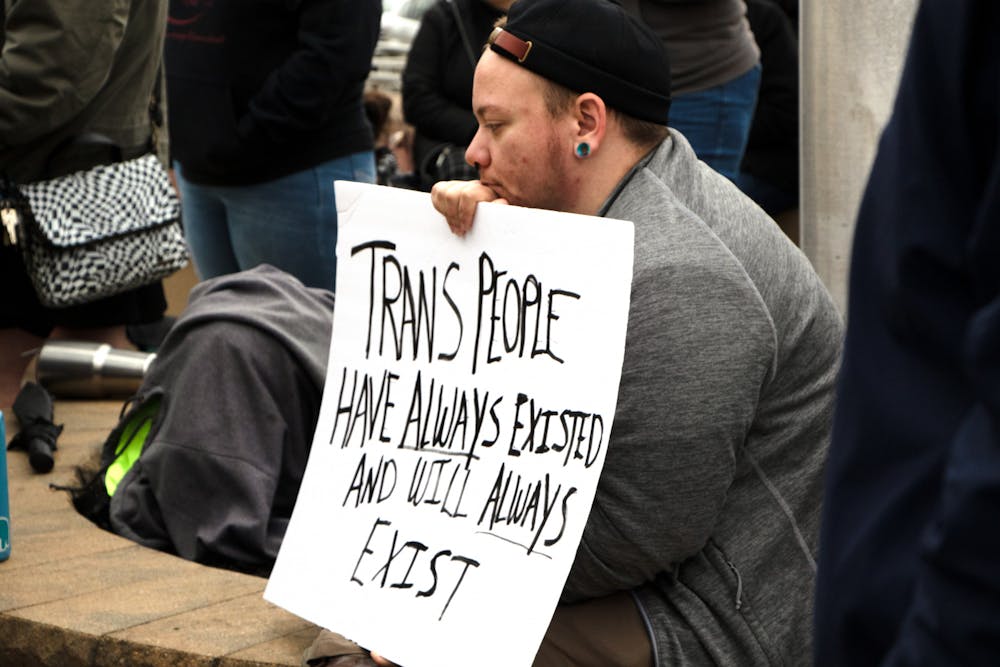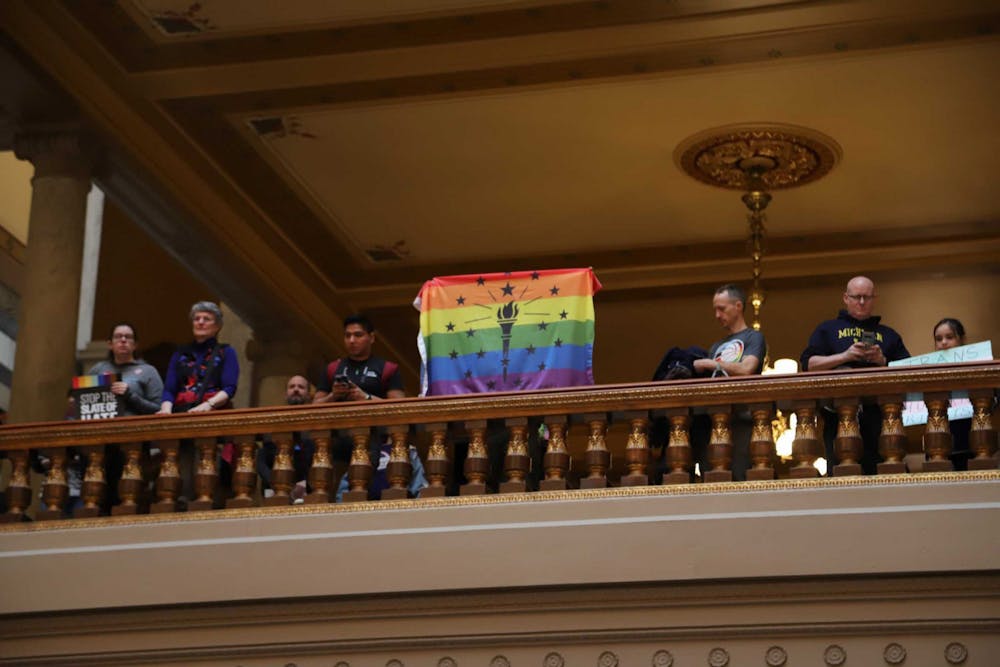Editor's note: This story has been updated.
Seven days.
Starting March 29, Indiana Gov. Eric Holcomb had seven days to either sign or veto Senate Bill 480 before it went into effect.
On the final day, April 5, he signed the bill.
SB 480 prevents healthcare providers from performing gender-affirming care to people under the age of 18. This includes surgeries and hormone therapy.
The bill defines gender as “the psychological, behavioral, social and cultural aspects of being male or female.” It defines gender reassignment surgery as “any medical or surgical service” that aims to surgically alter or remove any “healthy” characteristics that relate to an “individual’s sex,” genital and/or nongenital.
The American Society of Plastic Surgeons defines gender affirmation surgery, also known as gender confirmation surgeries, as surgeries “performed by a multispecialty team that typically includes board-certified plastic surgeons.” The goal is to give transgender individuals the physical appearance and functional abilities of the gender they know themselves to be.
The bill defines gender transition as “the process in which an individual shifts from identifying with and living as a gender that corresponds to his or her sex to identifying with and living as a gender different from his or her sex, and may involve social, legal or physical changes.”
The National Center for Transgender Equality defines gender transition as “the time period during which a person begins to live according to their gender identity rather than the gender they were thought to be at birth.”
Indiana Sen. Tyler Johnson, also an emergency room physician, authored the bill Jan. 19. Johnson is currently being sued for malpractice.
According to the complaint of damages for the case, Jennifer Becerra is suing Johnson over the death of her 20-year-old daughter, Esperanza Umana, at Parkview Hospital in Fort Wayne, Indiana. Umana suffered a cardiac arrest and died under Johnson’s care Jan. 12, 2018, according to the lawsuit.
A hearing is set for April 24, according to AP News.
Indiana Sen. Ed Charbonneau, district five representative, and Indiana Sen. Gary Byrne, district 47 representative, authors of SB 480 directed The Daily News to Johnson.
The Daily News reached out to Johnson, but he declined to comment.
Indiana Sen. Scott Alexander, a coauthor of the bill, a Ball State University alumnus and Delaware County representative, responded to The Daily News with a statement via email.
“This bill is common-sense public policy to protect Hoosier children from irreversible unproven life-altering procedures,” he said via email. “We have the utmost compassion for these kids, and there is a pressing need to protect children from irreversible unproven life-altering procedures.”
Alexander said via email SB 480 is not an attack on the transgender community.
According to a FAQ sheet Alexander provided, SB 480 will not prohibit counseling for people under the age of 18 who are experiencing gender dysphoria, nor will it prohibit treatment of “physical sex disorders.”
The FAQ sheet states “the mental and emotional effects of undergoing these procedures are still being studied, and there is a lot scientists still don’t understand.”
The bill has medical exemptions, but it doesn't clarify what those are.
Kathy Feeney, a certified family nurse practitioner at Open Door Health Services, said legislators should not be making medical decisions.
“It is my medical opinion that all of these decisions should be made strictly between patients or families and providers,” Feeney said via email. “Medical providers go through extensive training in order to provide evidence-based care. Untrained legislators should not be overriding that extensive training nor should they be inserting themselves into private medical decisions.”
Feeney said SB 480 is “a dangerous bill that sets up our most vulnerable youth for significant harm,” and that mental health will worsen.
Regarding surgeries, Feeney said via email “no competent provider who is following best practices is performing genital surgeries on minors.”
Katie Blair, advocacy and public policy director of the Indiana American Civil Liberties Union (ACLU), organized “Rally to Protect Trans Youth” April 1 to voice opposition to the bill.
The event was held to “let the governor and lawmakers know that we’re here, and we’re not going to stop fighting and [to] urge them to stop the hateful bills that they’re considering,” Blair said.
Many at the rally shared concerns about the bill being grounded in what they believe to be false rhetoric and biased facts.
“This is a well-orchestrated campaign to push trans kids out of public life,” Blair said via email. “Much of the furor about trans healthcare isn’t grounded in reality. Rather, it’s propped up by cherry-picked studies, fringe ‘experts,’ a handful of political operatives from outside of Indiana and fear mongering.”
Indiana Sen. J.D. Ford, District 29 representative, also opposed the bill. Ford spoke at the Rally April 1.
“As a member of the LGBTQ+ community myself, I think it's important for me as a legislator to stand up for folks,” Ford said over email. “The transgender community is small. They make up under one percent of the population, and especially trans youth are in a vulnerable place both because of these bills and the stress and anxiety that they feel.”

Members of Muncie OUTReach held their own rally at the Muncie Courthouse March 31.
Tiffany Erk is a part of the Muncie community, and she has a 16-year-old transgender son who is currently taking testosterone. SB 480 will directly affect her family’s day-to-day life.
“We don't exactly know yet what the future looks like, but the care we are currently receiving will not be available in Indiana,” Erk said over email.
Erk views this bill as another hateful and harmful attack on the LGBTQ+ community.
“This is a carefully structured decision made with multiple medical professionals over several years time,” Erk said, “and to then have that right taken away feels like my son is getting beat up by the government, and everybody can see it, and nobody cares.”
Though Erk did not attend the Indiana ACLU’s rally, she’s been to the Indiana Statehouse three times the past month to protest bills against the LGBTQ+ community.
Ford said he is concerned about the mental health impact SB 480 will have on young Hoosiers. According to the Trevor Project’s 2022 National Survey, 54 percent of transgender and nonbinary youth in Indiana seriously considered suicide in the past year.
“Just filing these sort of anti-LGBTQ+ bills, according to the Trevor Project, sends the wrong message to our most vulnerable that they are not welcomed,” Sen. Ford shared over email. “I am doing my best to show them, by my fierce opposition to these bills, that we need their brilliance in this world, and although these are difficult times now, … I am hoping that this too shall pass and brighter days are ahead.”
The ACLU issued a statement April 5 following Gov. Holcomb signing SB 480.
“It’s a devastating day for our trans community in Indiana,” the social media statement read. “Governor Holcomb today signed a ban on gender-affirming health care for trans youth — ignoring the warning of parents, medical providers and transgender youth themselves. We intend to challenge this law in court.”
The ACLU filed a lawsuit against SB 480, stating it violates the Constitution including the Fourteenth Amendment Equal Protection clause. The organization also alleges the bill violates federal requirements for the Medicaid Act and the Afforable Care Act through prohibiting "essential medical services that would otherwise be authroized and reimbursed by Medicaid."
SB 480 will go into effect July 1, 2023.
The story may be updated.
Contact Hannah Amos with comments at hannah.amos@bsu.edu or on Twitter @Hannah_Amos_394. Contact Olivia Ground with comments at olivia.ground@bsu.edu or on Twitter @liv_ground_25.





